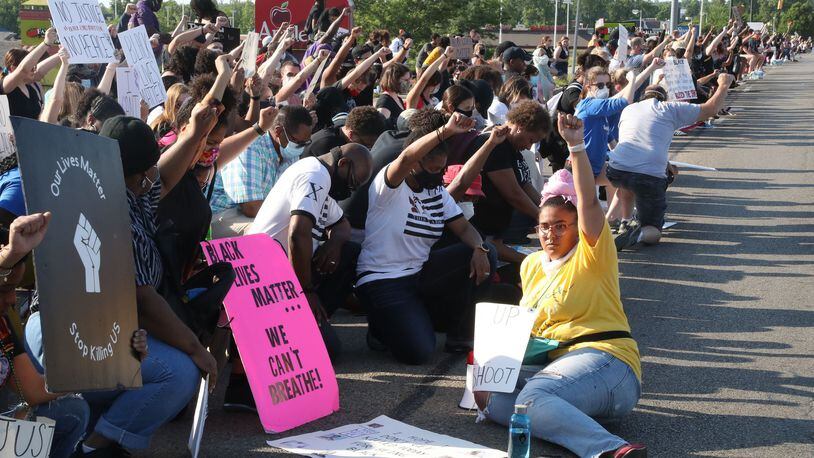On Sunday, more than 100 people gathered in Courthouse Square for an event organized by Women’s Healthcare and Family Medicine in Dayton to focus on racial inequities in the health care system.
»RELATED: Peaceful protests Saturday, calls for reform spread across region
“I think the effect of COVID then having on top of it the death of George Floyd, I think those two mixed together have been a kindling block for things to change,” said Dr. Andre Harris.
“We’re at the point now where if you’re quiet, if you’re silent in this, you’re complicit. Nothing is going to happen unless we all make a decision to change and we need to change how we’re delivering health care when it comes to our communities of color, our poorest communities.”
Harris said deliberate steps need to be taken, such as encouraging more black doctors and making sure health care professionals working in low income areas are paid better.
The size, diversity and momentum of the rallies and protests has been encouraging for people who have for years called for systemic changes.
»IN THEIR WORDS: Why locals protest and what change they want to see
“I must say I have been encouraged this week and I do feel there is a shift taking place, that something is changing, that something is happening, that God is doing a new thing and I’m encouraged by what I’ve seen,” Dayton Pastor Gerald Cooper told his congregation at Wayman Chapel in a Sunday morning service delivered via Zoom.
Cooper said he is encouraged that people not previously known for speaking out about justice are doing so and even prior critics of movements like Black Lives Matter are acknowledging that changes are needed. But, he said, there continues to be pushback from those who prioritize protecting their privilege over justice and mercy, which he called “God’s will.”
“If anybody is suffering, we are all suffering,” Cooper said.
»PHOTOS: George Floyd protests continue across Miami Valley
Discussions about reforms continue both locally and across the nation.
State and local officials have promised improvements; Dayton officials pledged more transparency about how police complaints are handled, training for officers to address bias and improved minority recruitment.
In Minneapolis, city council members are supporting radical changes to their city’s police department. The state of Minnesota launched a civil rights investigation of the department last week, and the first concrete changes came Friday when the city agreed to ban chokeholds and neck restraints. A more complete remaking of the department is likely to unfold in coming months.
Meanwhile other cities across the country such as New York, Chicago and Atlanta began to lift curfews as protests continued without violence seen early last week.
The city of Atlanta lifted a curfew it had set for 8 p.m. after days of peaceful demonstrations and two nights without any arrests.
Protesters again rallied in the city on Sunday. A group of African American pastors walked down Auburn Avenue — the street Dr. Martin Luther King, Jr. was born on — singing a protest song from the civil rights era with the lyrics, “Ain’t gonna let nobody turn me round.”
The Associated Press contributed to this report
About the Author
